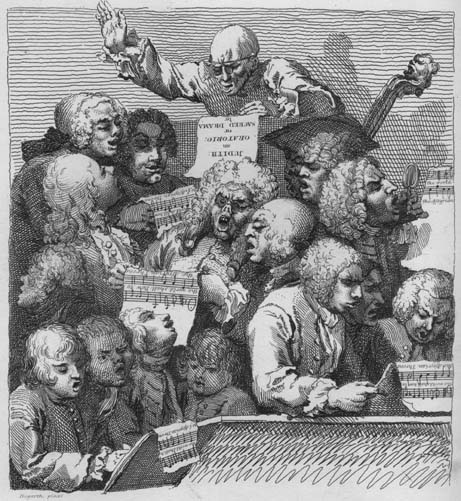West Gallery Music
associated with Great Warley
John Arnold (c. 1720-1792) is
generally recognised as 'coming from' Great Warley, but exactly in what
context is unknown. In 1740 he published his Compleat Psalmodist,
and, in common with many itinerant singing masters and publisher-composers
of the time, acknowledged that in addition to forty-two "of his own
composing", he included four tunes by 'Mr. Philemon Chalk, one of the
[singing] society of Great-Warley'; one by 'Samuel Laisel, of great Warley';
and one by 'John Harwood, leader of the tenor[s], of Great-Warley'.[xiii]
It would appear , therefore, that there was a flourishing band of singers
(and possibly, later in time, instrumentalists) who made up not only a
singing society, but presumably also the village choir of the time. One
assumes that Arnold was probably their choir master and leader, although as
a psalmodist he would almost certainly also be travelling about from church
to church teaching people to sing and selling his books of psalmody.
Arnold was a good observer of
current practice, and recorded what he saw and compared this with what had
been:
'In the
churches of London and Westminster, which abound chiefly with large
congregations, it is customary for the people, who chiefly sing by ear, to
follow the organ, in those churches that are furnished with that most
excellent instrument; but in churches where there is no organ, they
generally follow the clerk, who sings the melody of the tune . . .
'In most country
churches the psalms used to be sung formerly much after the same manner as
is now used in the churches in London etc., . . . till about half a
century ago, when several books of psalmody were printed and published,
containing some very good psalm tunes and anthems in four parts; of which
the people in the country soon became particularly fond, so that in a few
years almost every country church had one belonging to it; which, in some
places had the distinction of the choir of singers, in others the
society of singers; and, in very remote places where they were not
so polite, they had the appellation of the singers only, being, for
the most part, placed in a gallery or singing pew, erected for that
purpose.'
Arnold saw the change in the country
churches as being greater than in the towns, and in one sense it was,
because it involved the introduction of completely new kinds of music. In
town churches the same old psalm tunes continued to be sung, though the
introduction of an organ would obviously have an immediate and drastic
impact on the effect of the music, setting a new professional standard.[xiv]
Arnold, John (c. 1720-92)
Psalmodist of Great Warley, Essex; published music for Leicestershire too
The compleat psalmodist
1741 (P117); 1 new FT
1750 2nd edn; (P117.2); 3 FTs
1753 3rd edn; 3 FTs
1756 4th edn; 3 FTs
1761 5th edn; (P117.5); 3 FTs, 1 joint
1769 6th edn; 3 FTs
1779 7th edn; (P117.7); 4 FTs
The psalmist's recreation 1757 (P163); 1 new FT
The Leicestershire Harmony
1759 (P169); 23 new FTs; copy at Leicestershire Record Office
1767 2nd edn (P169.2); 25 FTs, 2 new; copy at Leicestershire Record Office
Church music reformed 1765 (P190)
A supplement to the complete psalmodist [1777] (P233; sequel to
The compleat psalmodist; but see date of 7th edn); 1 new FT
